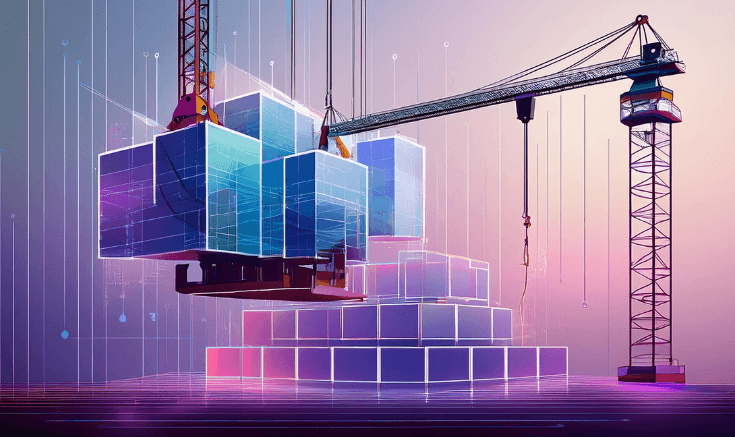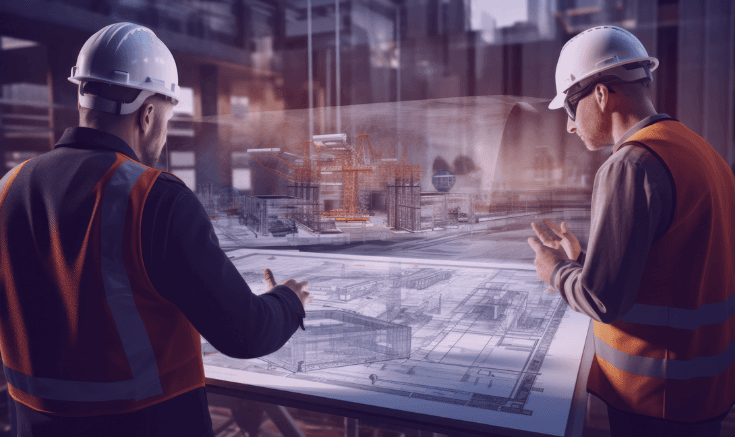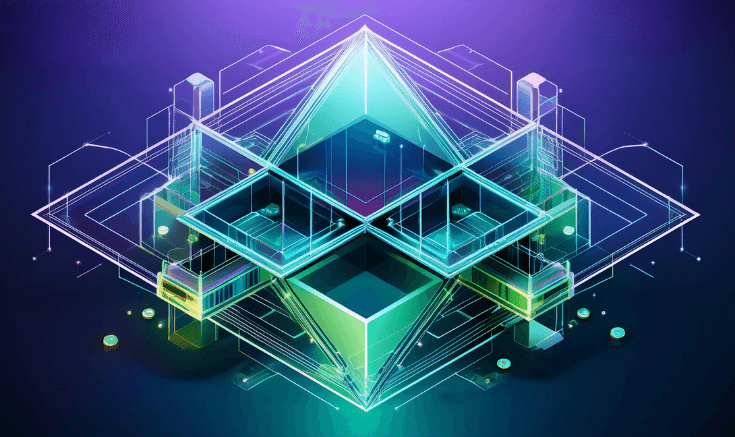

How can AI be used in construction?
NOV. 15, 2024
8 Min Read
Artificial intelligence is unlocking new possibilities in construction, transforming how projects are planned, managed, and executed.
AI technologies analyze vast amounts of data in real-time, enabling construction companies to make faster and more informed decisions. From designing complex structures to optimizing resource allocation, AI drives higher efficiency and accuracy across the board.
Safety is another critical area where AI is making a profound impact. AI-powered monitoring systems detect potential hazards on-site, ensuring compliance with safety protocols and preventing accidents. These systems leverage computer vision and machine learning to analyze site conditions continuously, alerting supervisors to risks before they escalate. This proactive approach to safety is saving lives and reducing costly project delays.
The applications of AI extend beyond individual projects to include large-scale benefits like sustainability and cost management. Predictive analytics improve equipment maintenance schedules, while advanced scheduling tools streamline timelines. With AI's potential to enhance every facet of construction, companies are positioning themselves for more significant innovation, sustainability, and success in an increasingly competitive industry.
Key takeaways
- 1. AI in construction enhances productivity, safety, and cost efficiency, addressing critical industry challenges with insights.
- 2. By optimizing project planning, resource allocation, and predictive maintenance, AI helps firms manage complex projects efficiently.
- 3. AI tools, such as BIM, computer vision, and robotics, automate labor-intensive tasks, improve safety compliance, and reduce human error.
- 4. The future of AI in construction includes autonomous sites, improved sustainability, accessible tools for smaller firms, and refined predictive analytics.
- 5. Addressing challenges in AI implementation, such as initial costs, training, and data security, is essential for achieving successful integration and maximizing ROI.
Understanding AI in the construction industry
In construction, AI involves using intelligent systems to perform tasks that normally require human expertise, such as data analysis, strategic decisions, and predictive forecasting. Core AI technologies like machine learning (ML), natural language processing (NLP), and computer vision enable systems to interpret and act on complex data quickly and accurately. These systems can analyze patterns across vast datasets, such as weather forecasts, past project performance, and material cost fluctuations, to provide actionable insights that guide project planning, resource allocation, and safety protocols. In the construction industry, these technologies are embedded in tools that support project planning, resource management, and on-site monitoring, giving construction companies the insights needed to make strategic decisions and improve project outcomes.
Historically, construction has been a highly manual industry, relying on hands-on labor and traditional project management methods. This dependency on manual processes often led to inefficiencies, budget overruns, and safety risks, as critical decisions were based more on intuition and past experiences than on real-time, data-informed insights. AI changes this dynamic by allowing companies to automate repetitive tasks, track real-time progress, and identify potential issues before they occur. This means that managers can make adjustments to schedules, resources, and workflows as projects unfold, reducing delays and ensuring that projects stay on track.
AI also enhances collaboration across teams, allowing project managers, engineers, and on-site workers to access real-time data and insights that improve communication and decisions. For construction firms, the shift to AI isn’t just about adopting new tools; it’s about creating a more efficient, reliable, and safe work environment where productivity, safety, and quality are continuously optimized. As more companies integrate AI, it is becoming clear that these tools offer a pathway to a smarter, more adaptive construction industry that can respond more effectively to industry challenges, client demands, and economic pressures. AI not only provides a strong advantage but is also an essential component of a sustainable, future-proof construction strategy.
“AI in construction is not just about new technology; it’s about fundamentally reimagining how projects are designed, managed, and executed.”
Key benefits of using AI in construction

AI offers construction companies a range of practical benefits, driving efficiency, improving safety, and ensuring more predictable project outcomes. By adopting AI technologies, construction firms gain powerful tools for tackling complex challenges, enhancing quality, and optimizing costs. Here are some of the primary ways that AI technology brings value to construction:
1. Increased efficiency and productivity
AI tools streamline processes, analyze large datasets rapidly, and automate routine tasks, reducing project timelines significantly. By optimizing workflows and minimizing manual input, AI allows construction teams to boost productivity, improving project turnover and reducing labor costs. For example, AI-driven scheduling software can automatically allocate tasks, track their completion, and alert project managers to potential bottlenecks, ensuring that every phase of construction proceeds without interruption. The cumulative effect of these efficiencies leads to faster project completion rates, which can positively impact profitability and free up resources for future projects.
2. Improved project planning and forecasting
Predictive analytics tools with AI analyze historical project data and external variables like weather patterns, enabling companies to anticipate future needs more accurately. This means AI can forecast material requirements, project durations, and workforce needs, leading to more accurate planning and fewer unexpected delays. By proactively anticipating supply needs or labor requirements, construction managers can make adjustments to prevent issues that could disrupt schedules. AI also enhances project planning by offering alternative scenarios, which allow managers to choose the most efficient project roadmap, reducing costly delays and overages.
3. Enhanced safety and risk management
AI-powered monitoring tools scan sites continuously to detect potential safety hazards in real-time. These insights allow managers to address risks proactively, leading to safer work environments and fewer on-site accidents. For example, AI-enabled computer vision systems can identify when workers are not wearing the required protective equipment and send immediate alerts to supervisors. AI’s predictive analytics also enable construction firms to anticipate and mitigate risks before they impact project timelines. With these tools, companies can improve compliance with safety regulations, reduce liability, and cultivate a safer culture that supports workforce well-being.
4. Optimized resource allocation and management
With AI, companies gain the ability to manage resources more effectively. AI can predict when materials or equipment will be needed and allocate them accordingly, reducing waste and minimizing the risk of costly project delays due to resource shortages. By analyzing factors such as historical consumption rates, material costs, and logistics, AI helps ensure that resources are used efficiently, reducing both waste and budget overruns. In addition, AI can track equipment usage in real-time, signalling when maintenance is due or when equipment is idle, further contributing to resource optimization.
5. Quality assurance and consistency
AI tools analyze construction work for consistency with design plans, identifying any deviations or quality issues early in the process. This helps to ensure that all work meets project specifications and minimizes the likelihood of expensive rework down the line. AI systems can compare construction progress against blueprints or 3D models, flagging discrepancies and allowing for immediate corrective actions. This quality control is not only beneficial for maintaining high standards but also for improving client satisfaction and reducing warranty claims, as AI-driven oversight leads to a more reliable and consistent final product.
By delivering these advantages, AI supports construction companies in achieving their project goals with greater accuracy, efficiency, and safety. Each of these benefits highlights how AI goes beyond simple automation to provide a strategic edge that enhances construction quality and productivity. With AI integrated into their workflows, construction companies can confidently undertake complex projects, knowing they have robust systems in place to handle scheduling, resource management, quality control, and safety monitoring. As a result, AI is instrumental in building a construction industry that is not only more efficient but also more sustainable and resilient.
Tools and technologies: What’s available?

The construction industry now has access to a variety of artificial intelligence tools, each designed to address specific challenges from planning and scheduling to safety and quality assurance. These tools not only streamline operations but also improve accuracy and reduce the risks associated with traditional, manual construction practices. From 3D modeling to real-time progress tracking, AI tools provide construction firms with a comprehensive suite of capabilities that support project management and enhance collaboration across teams. Here’s a closer look at the key AI tools and technologies available for construction companies:
Building information modeling (BIM)
BIM software leverages AI to create detailed 3D models that represent every aspect of a construction project, including design elements, structural details, and material specifications. These models improve collaboration across teams by providing a shared visual reference, ensuring that all stakeholders—from architects to contractors—are aligned. BIM supports project visualization, enabling stakeholders to simulate different design scenarios and make adjustments before construction begins, reducing potential conflicts and errors.
AI drones and computer vision
Drones equipped with AI-driven computer vision capture real-time, high-resolution imagery on-site, monitoring project progress, identifying hazards, and assisting in accurate site assessments. These drones are especially useful for surveying large sites, where manual monitoring would be time-intensive and potentially less accurate. By providing a bird’s-eye view of the site, drones enhance safety and compliance, allowing managers to quickly identify and address potential risks or delays.
Robotics for automated tasks
AI robots perform repetitive tasks like material handling, painting, and bricklaying with high precision and efficiency. These robots are crucial in helping companies meet project timelines, especially in regions facing skilled labor shortages. Robotics automation reduces human error in repetitive tasks, resulting in consistent quality and fewer rework requirements. AI-enabled robots also adapt to changes in the work environment, allowing them to handle variations in tasks and respond to on-site conditions in real time.
Predictive analytics platforms
AI predictive analytics platforms analyze historical data and current trends to forecast project outcomes, assisting managers in making informed decisions on resource needs, labor allocation, and cost estimation. These tools identify patterns and risks that might not be immediately apparent, helping companies plan for contingencies and optimize budgets. Predictive analytics platforms offer insights into future costs, materials availability, and project duration, making it easier for companies to adhere to timelines and minimize budget overruns.
AI-based scheduling software
Scheduling software using AI optimize project timelines by taking into account multiple factors, including weather conditions, labor availability, and material delivery schedules. This software minimizes the likelihood of delays by adjusting schedules in real time based on changes in any of these factors, ensuring smoother project execution. With AI-based scheduling, companies can avoid over-allocating resources, ensuring that each project phase proceeds efficiently and remains aligned with the overall timeline.
These tools empower construction companies to tackle project complexities with greater confidence and precision, transforming traditional practices into efficient processes.
“With AI, construction companies can confidently undertake complex projects, knowing they have robust systems in place to handle scheduling, resource management, quality control, and safety monitoring.”
How to use AI in construction project management
AI has the potential to transform project management in construction, enabling managers to make better decisions, optimize schedules, and track progress in real time. By integrating AI tools, construction teams can manage resources more effectively, control budgets, and ensure quality, making project management more streamlined and data-driven. Here’s how construction teams can apply AI to improve project management:
1. Resource allocation and scheduling optimization
Artificial intelligence scheduling tools analyze project requirements, predict resource needs, and allocate materials and labor efficiently. By assessing past project data, these tools anticipate resource bottlenecks and adjust schedules in real time, ensuring all resources are used effectively. AI can also factor in external variables like weather conditions, transportation delays, and material availability, creating a dynamic schedule that minimizes downtime. For example, if a shipment is delayed, AI can reschedule tasks that do not require those materials, keeping the project on track. By optimizing both human and material resources, AI reduces waste, prevents over-allocation, and minimizes costly delays, ensuring that projects proceed without unnecessary interruptions.
2. Real-time tracking and collaboration
Real-time data collection allows project managers to track every aspect of the project as it progresses, from on-site activities to material usage and labor productivity. AI-driven dashboards consolidate data from various sources, providing a single interface where managers can monitor progress, flag issues, and adjust plans as needed. This capability enhances collaboration across teams by ensuring that all members—from on-site workers to remote managers—are aligned with the project’s goals and updated with the latest information. AI also helps identify trends in project data, such as productivity patterns or material wastage, and suggesting actionable improvements. This level of transparency helps teams communicate more effectively, addressing issues proactively and ensuring seamless coordination across departments.
3. Budget management and cost control
AI helps managers monitor expenses closely, identifying opportunities for cost reduction and ensuring that projects stay within budget. Predictive analytics allow for accurate budget forecasting by analyzing historical and real-time spending patterns, helping managers anticipate future expenses and avoid overspending. AI can also perform cost-benefit analyses, comparing material options and labor allocations to recommend the most economical choices. For instance, AI can suggest alternative suppliers if the projected cost of materials exceeds the budget, or recommend reallocating labor to higher-priority tasks if resources are limited. This proactive approach to budgeting reduces the likelihood of budget overruns, keeps project finances on track, and enables managers to make cost-effective decisions at every stage.
4. Quality control and compliance
AI-driven quality control systems compare project progress against the design plan, flagging inconsistencies that could lead to rework or compromise safety standards. By analyzing construction data, AI tools ensure that materials, measurements, and structural components adhere to specified quality standards, preventing costly errors before they occur. Additionally, AI can monitor compliance with local building codes and safety regulations, automatically notifying managers if discrepancies are detected. This continuous oversight reduces the likelihood of project delays related to failed inspections and improves client satisfaction by ensuring that all work meets or exceeds expectations. AI quality control systems not only save time by catching errors early but also provide a reliable standard for quality that enhances the overall project outcome.
Through these AI-driven project management capabilities, construction companies can deliver higher-quality projects on time and within budget, setting new benchmarks for productivity and operational excellence. By embracing AI in project management, construction firms can navigate complex projects with precision, enhance team collaboration, and achieve more predictable, positive outcomes.
“AI provides a powerful opportunity to enhance productivity, optimize resources, and create safer, more sustainable job sites.”
Challenges of implementing AI in construction
While AI offers substantial benefits, implementing it in construction presents several challenges that companies must address to fully leverage its potential. Understanding and planning for these hurdles can help construction firms transition smoothly and maximize the advantages of AI.
- Initial investment and costs: Implementing AI in construction often involves a significant upfront investment in software, hardware, and training. These costs can be prohibitive, especially for small and medium-sized firms with limited budgets. Additionally, ongoing expenses such as software subscriptions, maintenance, and data storage can add up over time. However, with strategic planning, companies can make phased investments and identify areas where AI offers the highest ROI, allowing them to balance short-term costs with long-term gains.
- Workforce adaptation and training: Introducing AI in the construction environment typically requires new skill sets, as many traditional processes are digitized or automated. Construction workers and managers may need extensive training to effectively operate AI tools and interpret data insights. For some employees, this shift may feel intimidating, as it can represent a significant change from established methods. Companies must invest in workforce training programs that not only provide technical skills but also foster a culture of openness to new technologies, helping staff adapt to AI confidently.
- Data privacy and security concerns: AI tools rely heavily on large datasets, raising issues related to data privacy and security. Construction companies may be required to handle sensitive information, including client details, project plans, and proprietary data, all of which need protection from cyber threats. To prevent data breaches and ensure compliance with data protection regulations, companies must implement robust cybersecurity protocols and continually monitor for vulnerabilities. Achieving this level of data security can be costly and time-consuming, requiring dedicated resources and expert oversight.
- Integration with existing systems: Integrating AI with legacy systems can be a complex and time-intensive process, particularly for companies that have relied on traditional project management tools for many years. Compatibility issues, data migration challenges, and potential downtime are common concerns during integration. Proper planning, including a phased approach and comprehensive support, is essential to prevent disruptions to ongoing projects. Establishing clear communication channels and involving IT specialists can also help manage the complexities of integration and ensure that AI tools work seamlessly within existing infrastructures.
- AI expertise gaps: Many construction firms may lack in-house AI expertise, which can make it difficult to implement and manage AI effectively. This expertise gap often means that companies are unable to fully leverage AI’s capabilities, leading to underutilization or suboptimal application. Partnering with technology providers or hiring consultants can help bridge this gap, offering construction companies access to the specialized skills needed to deploy AI strategically. Building in-house expertise over time through training and hiring can also be a viable long-term strategy for companies committed to a digital transformation.
Addressing these challenges strategically can help construction companies use AI’s benefits without disrupting daily operations. By acknowledging potential hurdles and planning accordingly, companies can maximize the return on their AI investments, ensuring a smoother transition to AI-driven processes and paving the way for innovation in project management and execution.
Embracing change with AI in construction

Adopting AI is more than just integrating new technology; it’s a strategic step that redefines how construction companies operate, plan, and build. AI provides a powerful opportunity to enhance productivity, optimize resources, and create safer, more sustainable job sites. By embracing AI focused solutions, construction firms can address the industry’s toughest challenges head-on, from labor shortages and cost control to sustainability and safety compliance. Companies that invest in AI today are not just future-proofing their operations—they are positioning themselves as leaders.
At Lumenalta, we’re dedicated to helping construction companies AI’s transformative potential with customized technology solutions that align with your project goals. Whether you’re looking to enhance project efficiency, achieve greater safety, or drive measurable business impact, our expertise in AI integration can guide you through each phase of your digital transformation. Connect with us to explore how our solutions can empower your teams, improve outcomes, and set a new standard of excellence in construction.
table-of-contents
- Understanding AI in the construction industry
- Key benefits of using AI in construction
- Tools and technologies: What’s available?
- How to use AI in construction project management
- Challenges and disadvantages of implementing AI
- Embracing change with AI in construction
- Common questions about AI in construction
Common questions about AI in construction
What are the primary applications of AI in construction?
How can AI improve safety on construction sites?
What are the cost implications of implementing AI in construction?
How does AI help with construction project management?
What challenges do construction companies face with AI implementation?
Want to learn how AI in construction can bring more transparency and trust to your operations?








